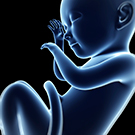
Scientists believed for a century that the human fetus is sterile and only becomes infected with bacteria during and after birth. Only in recent years did we find that's not true. I love it when we scientists are flat out wrong because it upholds the first rule in science: to question ' even things we take for granted.
It was in 2010 that a researcher tested the first stool samples of newborns right after birth and found a diversity of bacteria there. Since then the focus has been on how and from where the mother passes the bacteria on to her fetus. And, do the microbes include potentially harmful specimens or beneficial ones known as our microbiome which live in and on us to keep us healthy.
When researchers sampled the microbiome of the vagina, the samples didn't match ones found in newborns. Instead, a new study looked at the placenta, which is the tissue that provides nutrients to the fetus.
They collected 320 placentas taken immediately after birth and extracted DNA from each to sequence for microbial genomes. For the first time, they learned the placenta harbors microbes. Interestingly, they most closely resemble the microbiome of the mother's mouth.
Researchers believe the microbes break free when a mother brushes her teeth, enter her bloodstream, and then gets carried to the placenta. It would make sense since there's an established connection between gum disease and pre-term births. Indeed, the microbes in the placentas of preterm babies differed from those carried to term.
This study is a part of the U.S. Microbiome Project, which helps us understand the complex relationship between humans and the communities of bacteria, fungi, and viruses that live in and on us.
More Information
Placenta Harbors Bacteria, May Impact Fetal Health
Science Magazine — "Researchers have discovered a small community of bacteria living in a most unlikely place: the placenta, the organ that nourishes a developing fetus through the umbilical cord. The finding overturns the conventional wisdom that the placenta is sterile. The study also suggests that these microbes may come from the mouth, affirming that good oral hygiene may be important for a healthy pregnancy."
Human Microbiome May Be Seeded Before Birth
New York Times — "We are each home to about 100 trillion bacteria, which we carry with us from birth till death. But when Juliette C. Madan was trained as a neonatologist in the mid-2000s, her teachers told her in no uncertain terms that we only acquire those bacteria after we are born."
Not Sterile, After All: The Placenta's Microbiome
NIH Director's Blog — Dr. Frances Collins, director of the National Institutes of Health (NIH), writes in his blog about this new discovery and includes links to additional sources and information.